Erick Nielsen Enterprises: An Innovative Family-Owned Agribusiness
Erick Nielsen Enterprises, an innovative family-owned agribusiness, specializes in mechanical pruning and harvest services.
In the 1970s, a Northern California prune, almond and olive farmer named Erick Nielsen identified a need for mechanical pruning and harvesting solutions. Pruning is essential for many crops, but hand pruning can be incredibly time-consuming. To that end, Erick developed unique self-propelled mechanical pruners and harvesters. Mechanical pruning is a quicker, more efficient way, and often more cost-effective way to prune AND safer for the farm crew.
The Enterprising Sisters Behind Erick Nielsen Enterprises
Today, Erick’s vision is now a thriving agribusiness. Erick Nielsen Enterprises specializes in commercial almond, prune, and pistachio harvesting. They also offer commercial orchard mechanical pruning, hedging, cross-hedging, topping, skirting, and brush shredding.
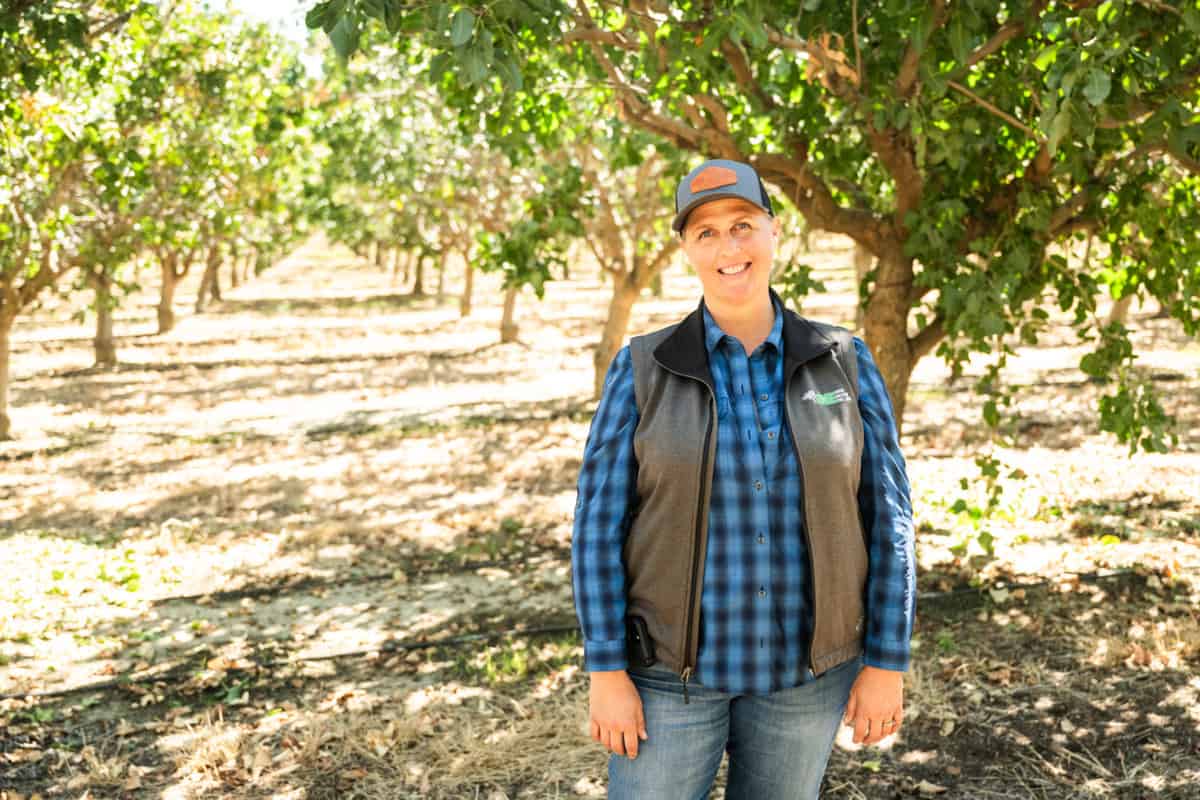
Hilary Nielsen Porter, CEO of Erick Nielsen Enterprises, remembers her father’s story, “The industry is full of innovation – farmers and growers who identified a need and worked on finding a solution. We’re one of the original companies that built mechanical pruning equipment to start doing that type of work. I think that’s an amazing story in California agriculture.”
The innovations of the ENE team are fueling the success of California farmers. “Some of our team helped pioneer better sizers and sorting techniques, making sure only the best Prunes reach processors. It’s that kind of hands-on innovation that keeps California Prunes at the top of global quality standards,” says Hilary.
Heather Nielsen Reed, social media and hospitality manager, reflects on how the company has grown and changed over the years. “Some of the guys we work with remember me as a little girl,” says Heather. “Now I’m seeing their sons and nephews step in. It’s an amazing changing of the guard.”
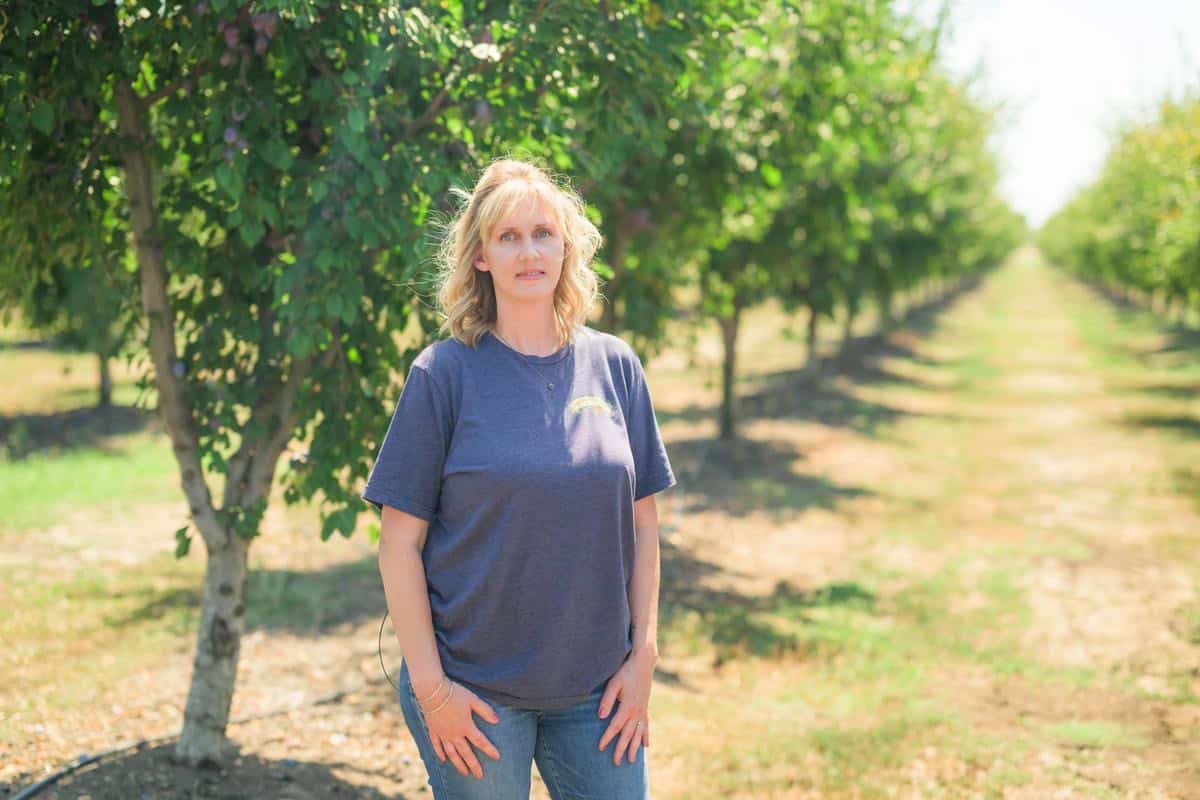
Joining the family business
Growing up on her family farm, Hilary and Heather were involved in agriculture from an early age. “We had the opportunity to help out,” she laughs, “sometimes a required opportunity.” Hilary explains, “My start was checking sprinklers, stacking brush, fertilizing baby trees, painting baby trees. As I got older, I started helping in different areas of the company – with safety, HR, and riding along with my dad and shadowing, often just to take notes and keep things organized. It was a great learning opportunity for me. In high school, I realized that this is actually work. Meeting with our growers and those different parts of managing a business was something I was interested in and wanted to come back to.”
After graduating from Cal Poly, Hilary excitedly returned home to Glenn County, joining the family business. “Being able to come back and see if there was a place for me in the family business and what I could contribute to the business was a really fun opportunity” says Hilary.
What’s it like to be a woman in an agribusiness?
California produces 99% of domestically produced prunes and nearly 40% of the world’s prunes supply, making the leadership of women like Hilary Heather more critical than ever.
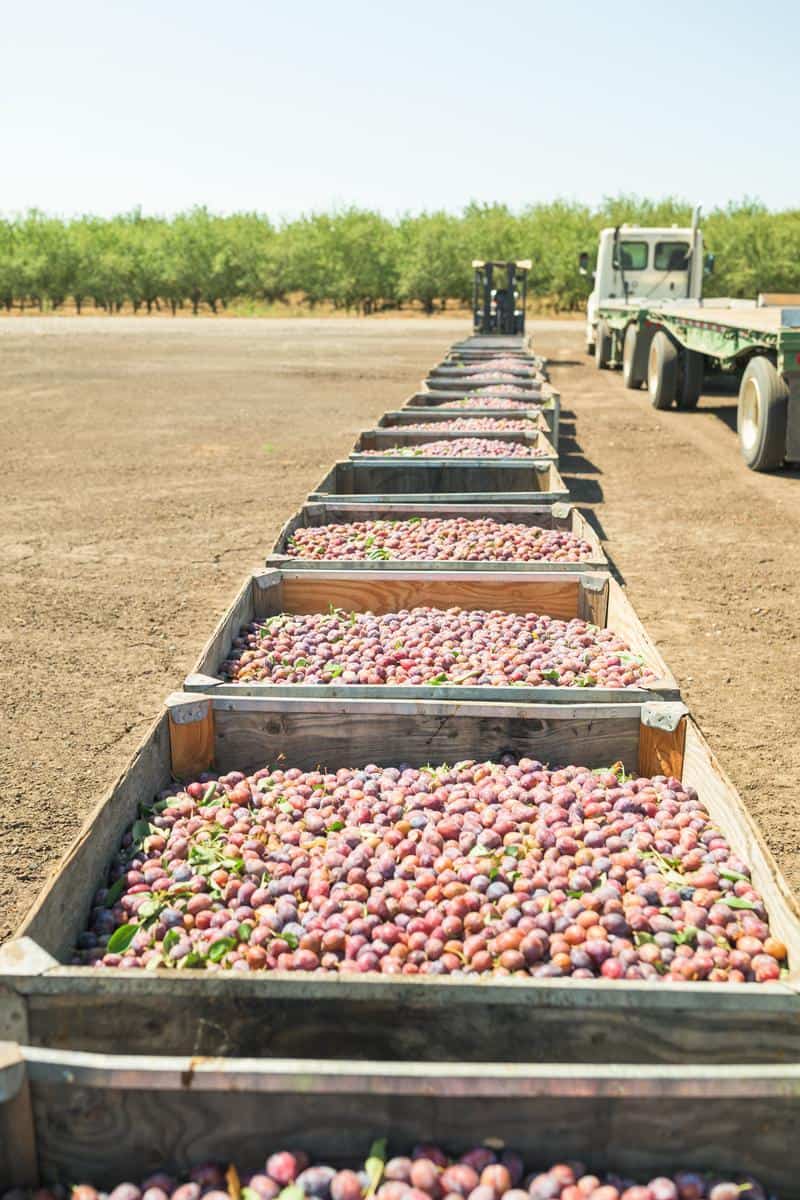
Agriculture has traditionally been a male-dominated industry. In Hilary’s case, she discovered that a career in agriculture offered a unique flexibility for women, particularly mothers.
She elaborates, “Family is really important for us as a company. For me, one of the great benefits was flexibility. Being a working mom in a family business meant maternity leave was kind of a nonexistent thing. Having my kids with me all the time, to have that flexibility to bring them out into the field as often as I could – which was frequent – was great. Being a mom and having kids – being able to blend my work-life balance – agriculture accommodates that well.”
Focusing on families
One of the things that makes Erick Nielsen Enterprises (or ENE) unique is their commitment to families. Every decision made at the family’s agribusiness is evaluated through the lens of how it affects families – whether the Nielsen family, the families of their employees, or the families they’re employed by.
“The work that we do is very family-oriented – we’re a family-owned business. But we also have family within our employee group and our team. Last summer, we hired youth employees, and we had some high schoolers who were a fourth generation working with ENE over the summer! We do a lot of leadership training – not just safety training, but communication and conflict management. Leadership skills, working with family, in addition to technical skills like electrical hydraulic welding. That investment in our employees and the training that we do benefits not just us as a company but our customer , our community, and their families,” she adds.
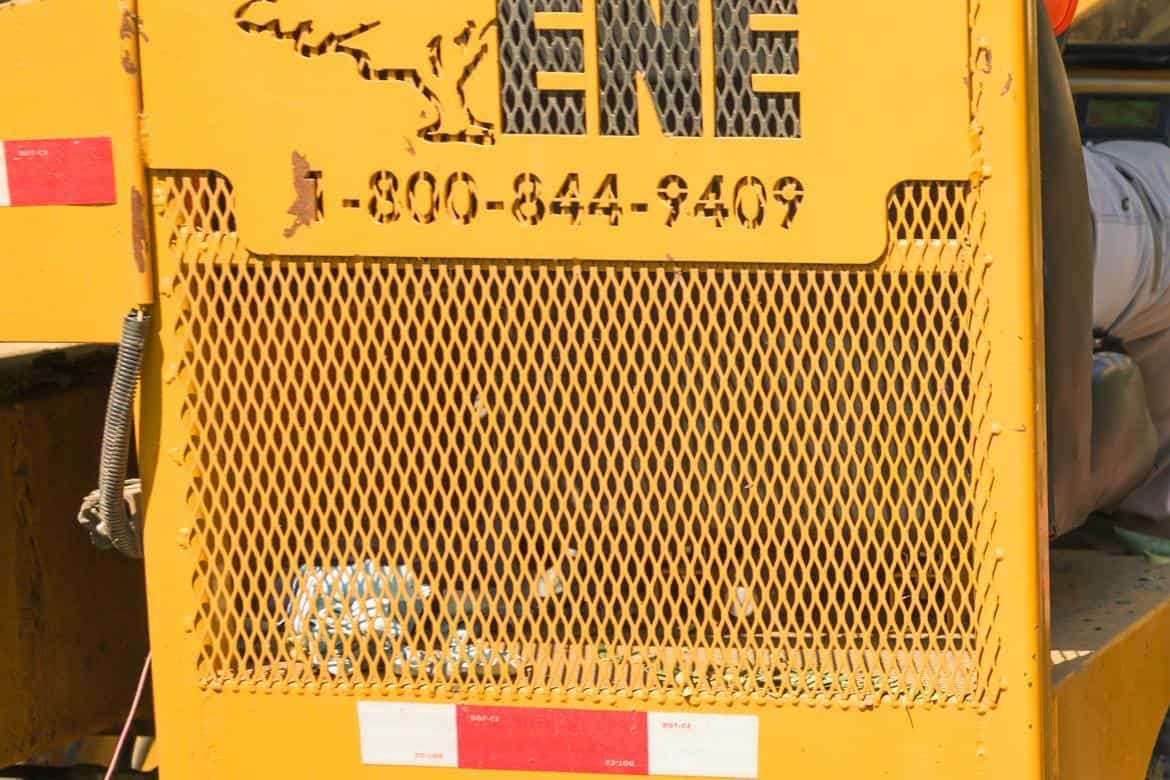
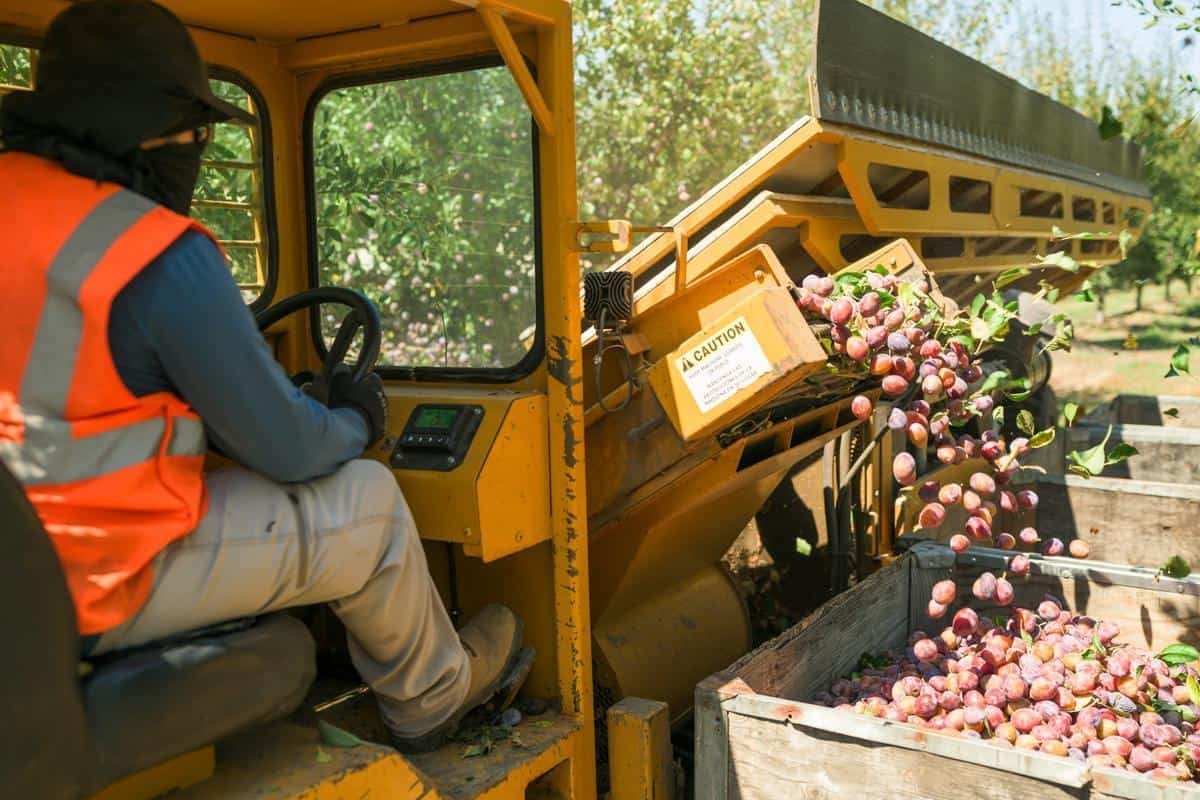
Skilled labor is essential to agribusinesses
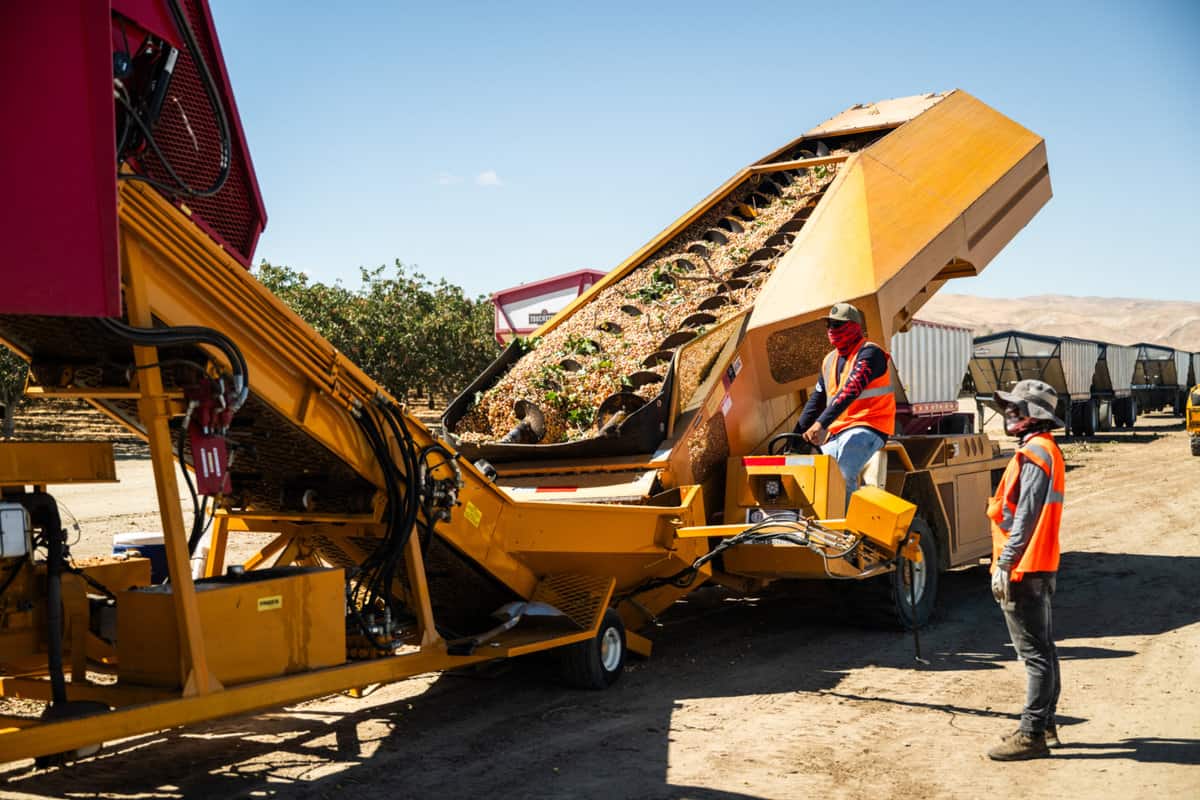
Hilary believes in the importance of retaining a well-trained workforce year-round. “We wouldn’t be anything without our people, really. The equipment is great equipment. We build it, we think it’s great equipment, but it wouldn’t do anything without great people.”
Behind every beautifully harvested California Prune is a crew of skilled individuals, many of whom have worked with ENE for decades. “We’re not micromanaging. Everyone takes responsibility. And that trust? It doesn’t happen without good people,” Hilary explains.
ENE employs 40 employees year-round, and during harvest season that number swells to 130 or more. “The best we can offer our customers is consistent, safe service from experienced operators and supervisors. That’s a big, big plus.”
Agriculture is highly seasonal, and pruning and harvest don’t occur year round. So, how does ENE manage to employ 40 people all year? Hilary responds, “We’re actually farmers that started doing some commercial work to add to our farming operation.”
September through Spring is the busiest time of year, with harvest and and mechanical pruning sometimes overlapping. In the springtime, when the commercial services slow down, the team sets to work fabricating new equipment, making repairs on existing equipment and, of course, taking care of the home ranch. “We’re always busy with fabrication and repair…and getting ready for the next season of harvest again”, Hilary smiles.
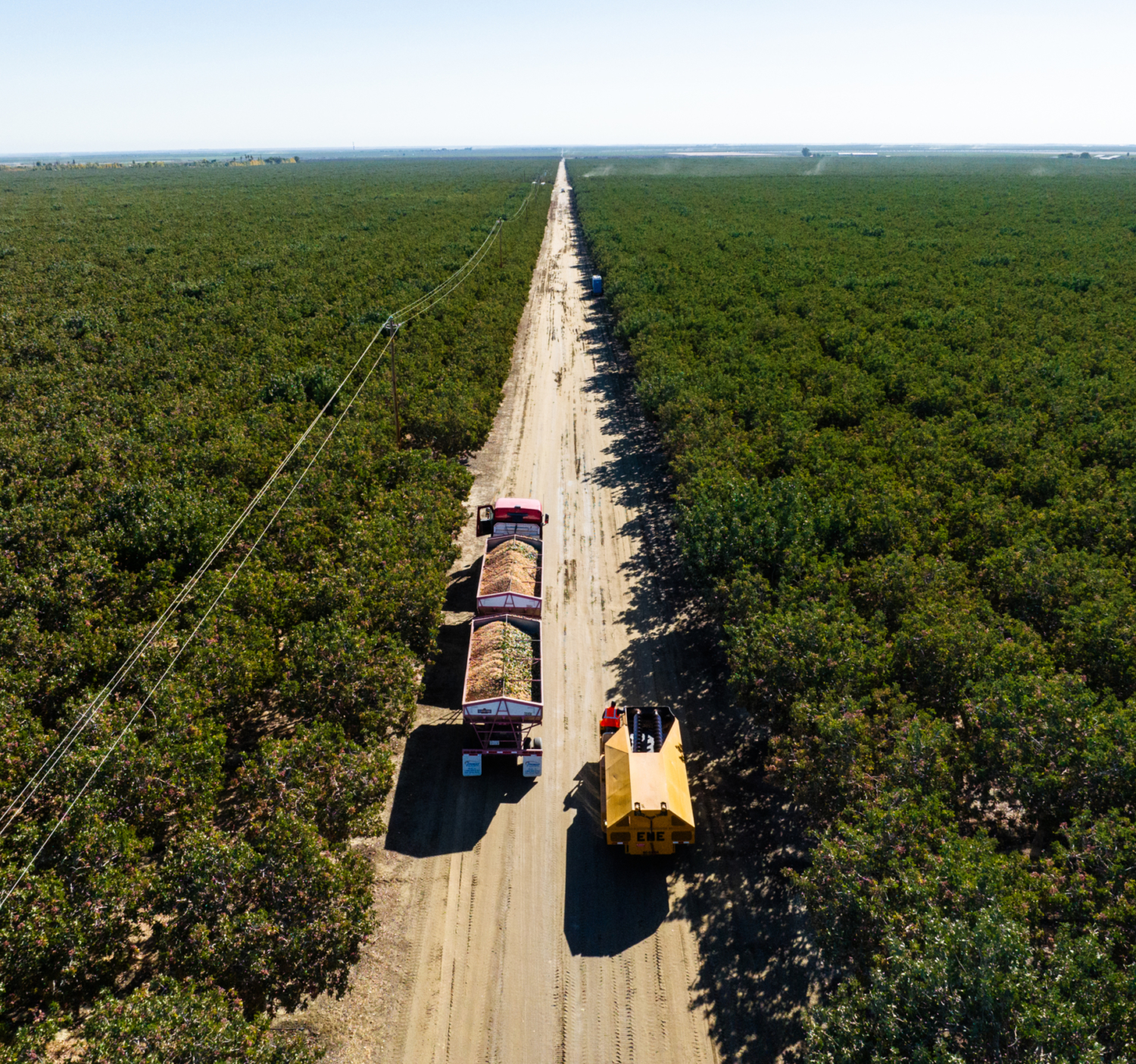
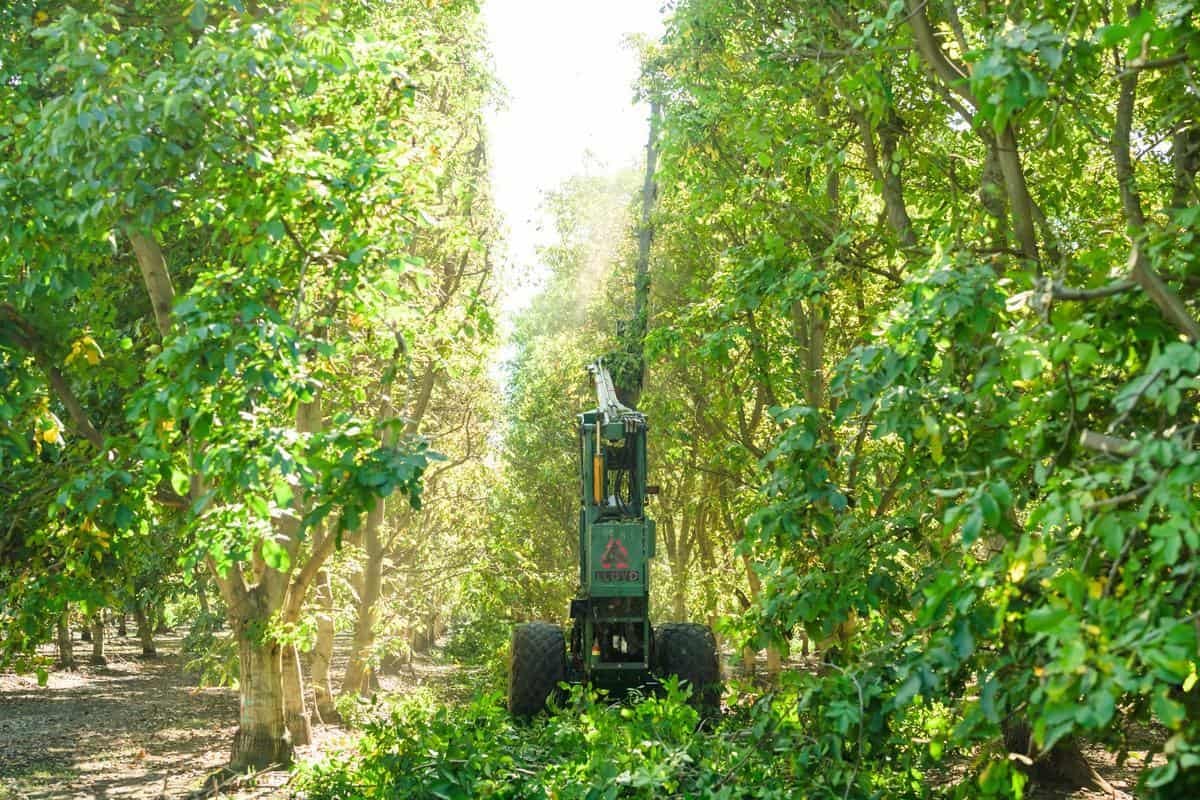
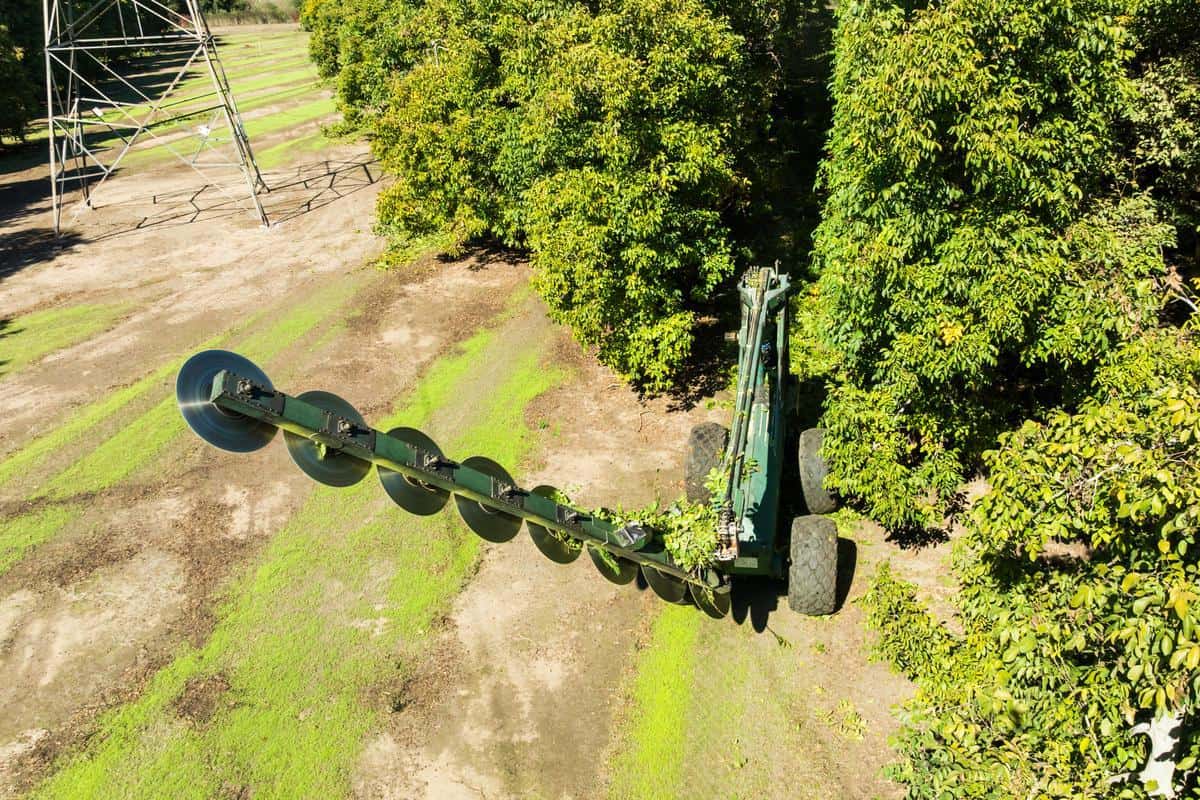
Prune farming demands precision. It’s making sure just the right amount of fruit stays on the tree for quality sizing, managing orchard health year-round, and responding to unpredictable weather. And after harvest, the work continues: brush shredding, orchard sanitation, and equipment maintenance stretch into winter.
That constant rhythm takes more than technical knowledge; it takes passion, patience, and a willingness to adapt. “It’s a gamble. But it’s beautiful to watch. And it’s brave,” Heather reflects.
Agribusiness, from a farmer’s perspective
Being farmers themselves gives the family-owned agribusiness a unique perspective and approach. Hilary explains, “Farmers work all year long for this. We’re here for a short time. We come in and take care of an orchard as if it were our own. That involves a lot of things. They (the customers) want a safe service provided. It’s dangerous work, so we’re careful around electric, telephone poles, pumps, lines, wires, ditches…you name it. We can get in and out and do a good job. Also, it’s the little things. I pick up a lot of garbage because if it was my orchard and I saw a stray piece of cardboard, I’d pick that up.”
Working together as sisters brings its own dynamic. “It’s a tightrope act at times,” Heather jokes. “But I have the utmost respect for my sister. I definitely don’t want her job.”
That mutual respect, combined with a deep love for California farming, is what keeps ENE thriving. Their leadership exemplifies what it means to be California-grown: deeply rooted in heritage, committed to sustainability, and boldly paving the way forward.
“We’re proud to be part of California agriculture,” says Hilary. “We’re proud to grow Prunes. And we’re proud to help other growers succeed too.”
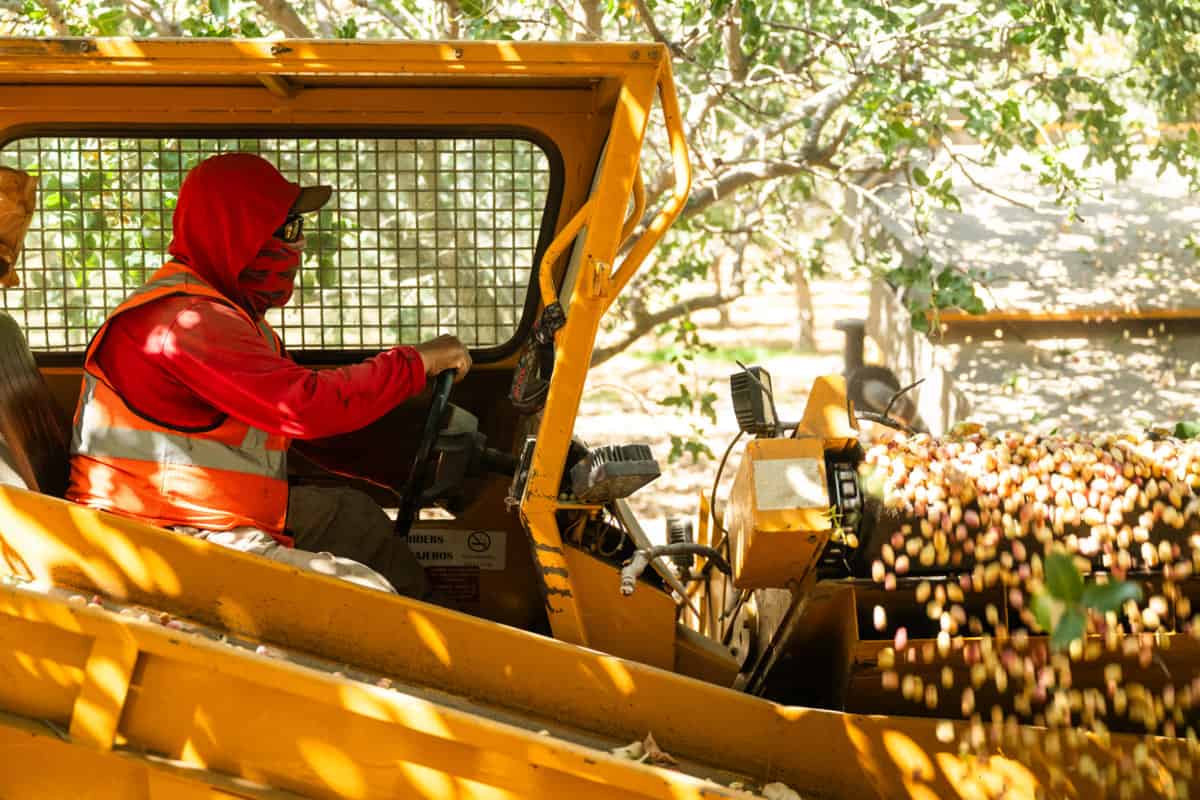
Hilary attributes ENE’s faithful customer base to this attention to detail and to the deliberate cultivation of relationships. “We’ve worked for a lot of the same folks for decades. They can depend on us at this crucial time to get the job done well. We want to have a great relationship with the people that we work for.”
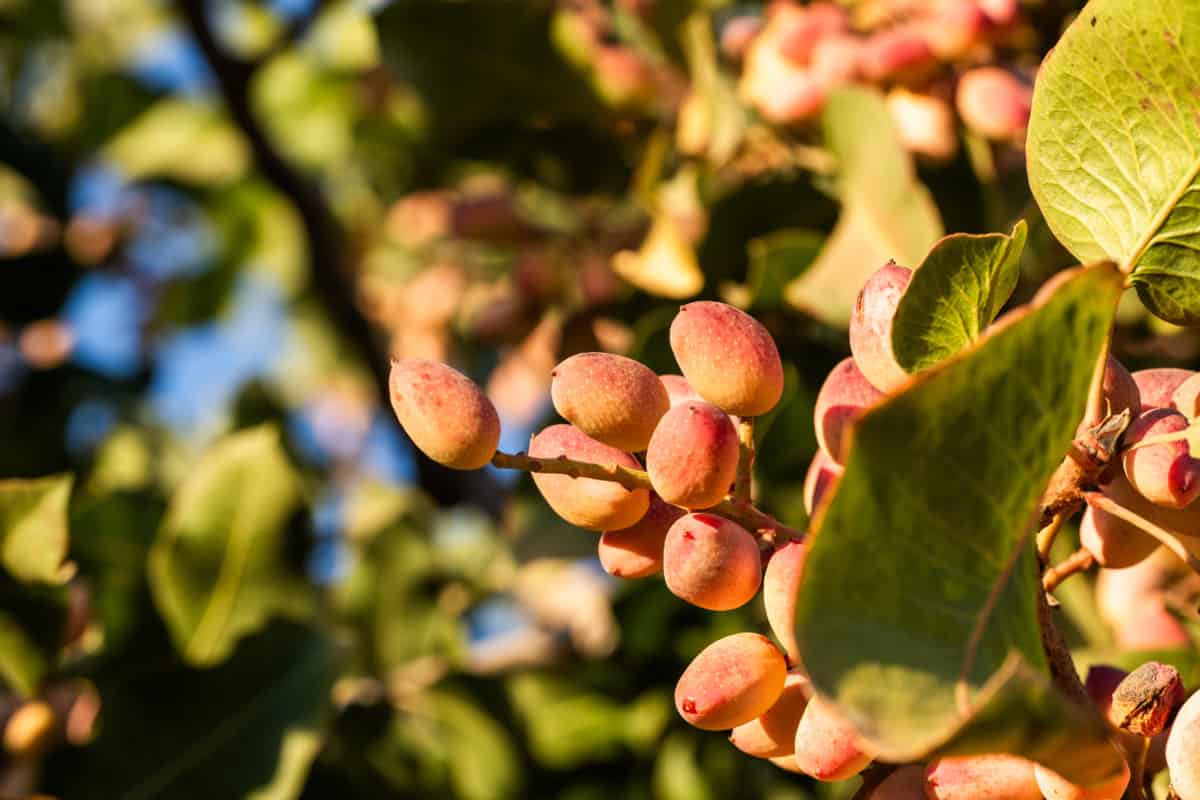
How are pistachios harvested?
Want to learn more about how pistachio nuts are grown and harvested? We tagged along with Hilary to one of ENE’s job sites for an inside look!
Orchard FAQS
Proper pruning allows for light penetration and airflow – conditions necessary for an optimal crop.
Every orchard and grower is different. Some rely exclusively on mechanical pruning, while others supplement with specialized hand pruning.
An agribusiness is a business that is “derived from or connected to farm products”.
Why California Grown Matters
California agriculture doesn’t just feed the nation, it leads the world. And when consumers choose California Prunes, they’re supporting more than just a product. They’re investing in local families, long-standing legacies, and a sustainable, community-driven approach to farming.
For Hillary and Heather, the work is personal. It’s about honoring the past while building a better future—for their families, their industry, and for everyone who values food grown with care, skill, and purpose.
This is California Grown, this is women in agriculture and this is the future, rooted in Prunes.

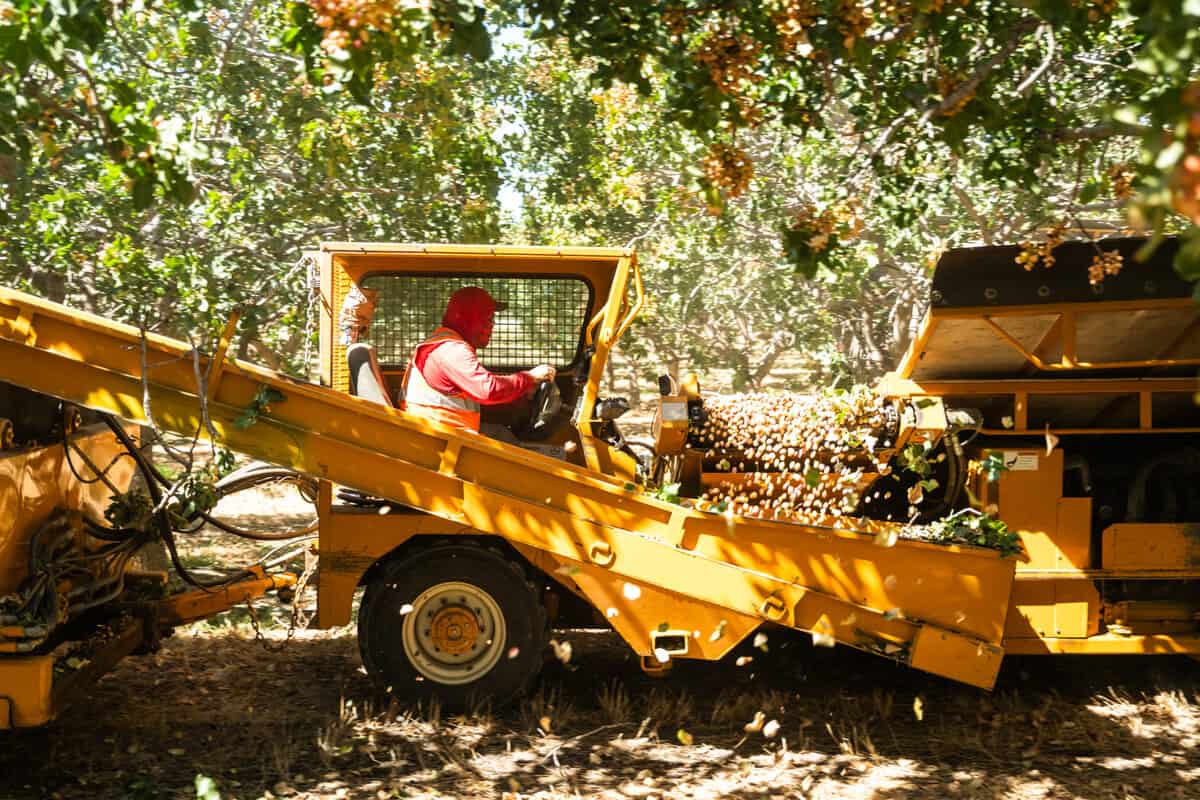
Hi,
I am a professor emeritus of economics at UC Davis. I am finishing up a book on Agricultural Mechanization in California. I would like to talk briefly with Hilary Porter about pre-mechanization harvest practices. As an aside, I spent much of my youth working on my granddad’s and uncles’ prune operations in Santa Clara/San Jose. Maybe Hilary can send me an email to start the conversation.
Thanks,
Alan
Hi Alan, we are not affiliated with Erick Nielsen Enterprises we only interviewed them for this article. You will need to reach out to them directly.